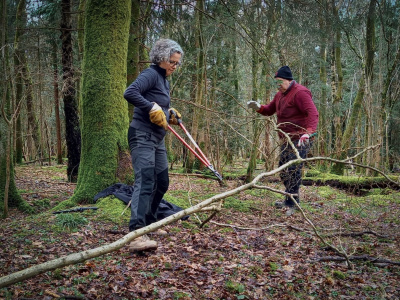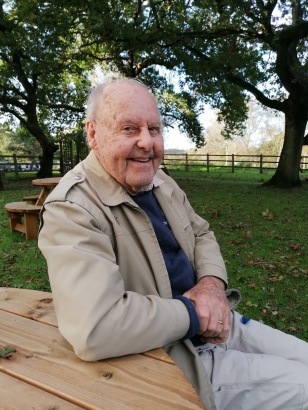
Introduction to Coppicing
- Lag Wood, Hassocks
- 13 Nov 2025
Now more than ever, we need solutions to managing our woods in the best way possible to help ensure they thrive for generations to come. That’s why we set up the Esmond Harris Award for Innovation in Small Woodland Management, in 2022, to unearth the creative and unique methods and tools that are working well in woodlands across the UK.
The aim of the award is to showcase best practice and ingenious problem-solving in our sector. Now in its fourth year, the annual competition aims to discover creative solutions to woodland challenges, clever hacks that streamline tasks, proven strategies to enhance biodiversity, and technology that revolutionises the jobs involved in caring for our woodlands.
The competition for 2026 will open in April.
2025 – Kesty and Martin Jakes of Sladebank Woods, in Stroud, Gloucestershire, were awarded the accolade for their significant efforts in managing a small woodland sustainably by increasing community involvement through accessibility and connection. Thanks to their hard work and vision, Sladebank Woods has become a working woodland, as evidenced by the energy, activity and engagement of countless visitors over the years. The careful ecological management of the site has included a programme of selective felling and replanting for wider diversity to increase Sladebank's future resilience. The range of visitors and participants is testament to Kesty and Martin’s welcoming and inclusive approach, which has even made it possible for wheelchair-using students from a local special school to enjoy them.
2024 – Winners Carolyn Church and Hugh Ross were selected in recognition of their work to develop an effective technique of dead hedging in their woodland in Rawhaw Wood, Northamptonshire. Their winning technique used brash bundles, packed between stakes up to a height of around 6ft, creating a natural structure that provides an impenetrable barrier to deer, enabling hazel coppice to regrow unhindered. As well as keeping costs to a minimum, Carolyn and Hugh's method provides a valuable habitat that is used as a wildlife corridor and hunting ground. After four or five years, the dead hedge begins to slowly decompose, accommodating various types of invertebrates and fungi, before some of its carbon is reabsorbed into the soil.
2023 – Made posthumously to Andrew Cartwright for his long-term dedication to establishing a sustainable Welsh woodland supporting biodiversity at Coed Gwinllan Tyddyn, in Gwynedd, North Wales.
2022 – Hugh Dorrington, from Lincolnshire, who won for effectively producing high-quality timber while prioritising biodiversity, despite ash dieback and grey squirrel issues.
Our award is named after Esmond Harris (pictured below), a long-standing Small Woods member, author and retired director of the Royal Forestry Society. Esmond is on the judging panel along with our CEO Simon James.

Esmond Harris at Staverton Park